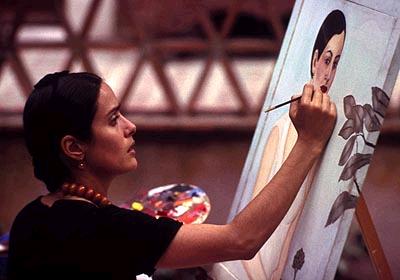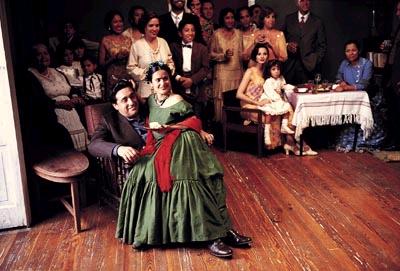

The biggest thing one can say about Frida is that it is a disappointment. Sometimes, the story behind making the movie is so much more interesting than the movie itself. Frida exists because of Salma Hayek, who spent eight years developing this movie. Madonna tried earlier and failed. Jennifer Lopez actually competed with Hayek (Searching for Debra Winger, Traffic) to get the movie made. There is so much buzz behind Frida that actors like Edward Norton, Ashely Judd, Antonio Banderas, and Saffron Burrows all wanted small roles just to be in the film. Mexican artist Frida Kahlo was a painter, Communist, bisexual, victim of a horrifying trolley accident, wife of muralist Diego Rivera, and so much more. In biographical films, there are two general approaches to take. The first is to take a chronological approach to the subject, presenting the life in order. The second, and usually more interesting, is to take a short portion of the overall life of the subject and shows how it relates to his/her life as a whole. Frida opts for the first method.
The two most important relationships in Kahlo's life are, arguably, the one between her and Rivera (Alfred Molina, Texas Rangers, Chocolat) and the one between her and her body. Rivera was the love of her life, and many years her senior. They married when Kahlo was young, and Rivera encouraged her to paint and brought her along as he traveled the world. She became disillusioned with his continual infidelity, and went as far as to steal his lovers from him. He claimed that it was just sex, and that she was the only one he truly loved. By choosing the more conventional route, director Julie Taymor (Titus) tracks Kahlo's life like she was reading a timeline. So one can follow the course of the relationship between Kahlo and Rivera, and how its changes affect both their lives. She marries Rivera, goes to New York, comes back to Mexico, meets Leon Trotsky (Geoffrey Rush, Lantana, The Banger Sisters), and so on. What is missing is the passion behind Kahlo's work.
Kahlo's paintings were often grotesque. The pain that Kahlo felt came through in all her paintings. Body organs, blood, mutilated bodies, and other visceral images were frequent subjects of imagery. It is as if painting was cathartic to Kahlo, who was in constant pain because of her accident. She had to relearn how to walk, and spent years undergoing painful operations. Kahlo portrays this, but it seems like an afterthought. Instead, it should have been the primary focus of the film. Kahlo's paintings are the result of her pain, and this is not obvious from Kahlo. There are scenes with Hayek in pain, but not enough for the audience to really feel how much it influenced her. One wishes for more examples of her work on screen also. Frida is based Frida: A Biography of Frida Kahlo by Hayen Herrera and adapted by Clancy Sigal (In Love and War), Diane Lake, Gregory Nava (Selena, My Family, Mi Familia), and Anna Thomas (My Family, Mi Familia, A Time of Destiny).
Taymor does come through in a couple places. She is best known for her amazing costume work in the stage version of The Lion King. Her creativity here is a little more limited. As a director, she still has a lot to learn, but she still has an amazing eye for the more superficial elements of a movie. Frida looks very good. It has a vibrant, bursting with color, and has a larger-than-life feel to it at times. . The defining moment of Frida is when Taymor has Hayek laying, battered after the accident. It is horrible and beautiful at the same time, a perfect analogy to Kahlo's work. At other points, she has Molina and Hayek come to life from a painting, and has Hayek in makeup to resemble living paintings. This is when Kahlo is different and original, if only it happened more. And although Frida leaves much to be desired, it is still a strong role for Hayek, who usually works with material with a lot less substance. Still, one could only imagine what she could have done with the role had the script been better.